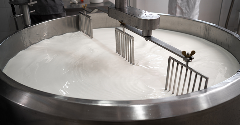News
Mintel: India represents strong opportunity for milk
23 Jan 2019India may be one of the largest milk producers globally, but the latest research from Mintel highlights strong opportunity to boost regular milk's health credentials.

India may be one of the largest milk producers globally, but the latest research from Mintel highlights strong opportunity to boost regular milk's health credentials.
While seven in 10 (71%) Indians have used milk at least on one occasion in the last three months* according to Mintel, only three in five (59%) Indian consumers associate milk with being healthy and just 37% perceive milk to be a high source of calcium. Moreover, Mintel research reveals that as many as three in five (61%) Indians are trying to eat more protein, but just 39% perceive milk to be a high source of protein, highlighting the potential which milk offers to protein-loving consumers.Today’s consumers are pursuing healthier lifestyles and adopting diets that are beneficial to their overall wellbeing, Mintel notes. Though Indian consumers may not fully recognise milk's health benefits, the company says, it seems they are open to support their healthier lifestyles with their glass of milk. Indeed, according to Mintel, over a quarter (26%) of regular milk drinkers in India are looking for milk with added nutrition (eg added calcium, protein, vitamins), while 22% are seeking milk offerings that provide specific health benefits (eg heart and bone health).Natasha Kumar, Food & Drink Analyst, India, at Mintel, said:“Milk has been traditionally associated with health benefits; however, this may no longer be the case in India today. Amidst reports on adulteration (such as the inclusion of ingredients with the likes of detergent and paint) consumers no longer see the value regular milk can provide them. There are many worrying lifestyle diseases cropping up in India, and consumers are vowing to adopt healthier lifestyles and actively seeking added benefits in all that they eat or drink. Manufacturers of milk products can tap into this situation by communicating milk’s health credentials, such as its high calcium and protein content. There is opportunity for dairy manufacturers to fortify milk in order to increase its association with ‘health’, particularly through providing benefits that target specific health concerns—enabling consumers to see value in the product.”In light of consumer demand, there is a call for dairy brands to focus on ethical and environmental claims. According to Mintel Global New Products Database (GNPD), there has been a steady decline in ethical and environmental claims in the milk and flavoured milk categories. In 2018, less than half (45%) of milk and flavoured milk launches in India carried ethical-environmental claims. In comparison, 52% of Indian milk and flavoured milk products launched in 2016** carried ethical-environmental claims.Highlighting the demand for eco-friendly milk, three in 10 (29%) Indian consumers say that they actively look for ethical claims or seals on packaged food or drink product labels. Building on this, a worry that is only just emerging is that 15% of milk drinkers in India have expressed their concerns around the welfare of dairy animals.“Dairy brands that effectively communicate their environmental and animal welfare credentials can potentially reap the benefits from people’s changing priorities. Consumers, today, are not only conscious of what they put inside their bodies but also what they put back into the environment. Therefore, when brands follow the same ideologies, are transparent about their practices and carry ethical claims, these informed consumers get up and take notice. This in turn gains their trust in the long run,” Kumar continued.Finally, Mintel says, it seems the time is ripe for brands to also reposition flavoured milk in the Indian dairy market—as just 23% of regular milk drinkers in India have drunk packaged flavoured milk in the last three months.Of these flavoured milk drinkers, a significant portion drink flavoured milk for emotional reasons; some 30% consume flavoured milk as a treat, while over a quarter (27%) do so to satisfy a sweet craving. Meanwhile, a quarter (23%) enjoy flavoured milk as a dessert. Looking for more choices, 14% of Indian regular milk drinkers feel that there are not enough varieties of flavour in flavoured milk.“Flavoured milk is still not a category that enjoys mainstream consumption in India. Instead, it is typically consumed on impulse, with a sizeable population of flavoured milk drinkers consuming it as a treat or dessert. Brands can look to reposition flavoured milk as a product that allows for permissible indulgence to increase its appeal among Indian consumers.” concluded Kumar.Related news

Consumers dislike faba beans’ sensory profile
3 Jun 2024
Consumers display low acceptance of faba beans, with sensory properties such as bitterness a core concern, a study suggests. However, for product varieties such as cocoa-free chocolate, this attribute could prove to be a benefit.
Read more
Food scientists uncover new way to preserve nutrient and flavour quality
29 May 2024
Researchers have developed a method that guarantees food safety for low-moisture products, such as dried milk, while maximising quality by retaining vitamins, minerals, and flavours, they say.
Read more
FDA scrutinizes milk pasteurisation over HPAI risk
28 May 2024
The US Food and Drug Administration (FDA) is undertaking additional scientific research work to ensure that approved pasteurization processes are rigorous enough after retailer milk tests showed contamination from Highly Pathogenic Avian Influenza (HPA...
Read more
Magnum targets ice cream lovers’ moods with new flavours
2 May 2024
Unilever-owned Magnum has released a suite of “mood-inspired flavours” as the 2024 ice cream season kicks off. The offerings, marketed as the Magnum Pleasure Express, are Magnum's first foray into the “mood-food” category.
Read more
The eight global food trends shaping the future of dining
23 Apr 2024
Unilever’s Future Menu Trend 2024 report identifies the global food trends shaping the food service industry, providing insights into changing consumer preferences that could provide inspiration for packaged food and drink brands.
Read more
Report outlines how the US interfered with marketing restrictions on formula across the globe
18 Apr 2024
A recent investigative report by ProPublica unmasked the extensive interference by the US government in international regulations concerning the marketing of formula.
Read more
Ultra-processed food intake in South Africa at concerning levels, study suggests
19 Mar 2024
As South Africa considers introducing front-of-pack warning labels and strict marketing limits for unhealthy foods, research has found that low-income South Africans get around half of their calories from ultra-processed foods (UPFs) – “a cause for con...
Read more
India’s mithai market develops new ingredient and flavour profiles
18 Mar 2024
Mithai is a hugely popular dessert and sweet snack in India and manufacturers are experimenting with unique ingredients, new flavour combinations, and healthier versions to capture new audiences.
Read more
Unilever and Perfect Day’s animal-free dairy dessert: Is precision fermentation the future of dairy?
6 Mar 2024
Perfect Day, a precision fermentation dairy supplier, has partnered with Unilever's Breyers, a brand of ice cream and frozen dairy desserts, to launch Breyers lactose-free chocolate frozen dessert.
Read more
Macauba oil emerges as potential rainforest-friendly palm oil alternative
1 Mar 2024
Producers and researchers consider the rainforest-friendly credentials of Macauba palm oil and whether its sustainability credentials offer an opportunity to replace palm oil.
Read more